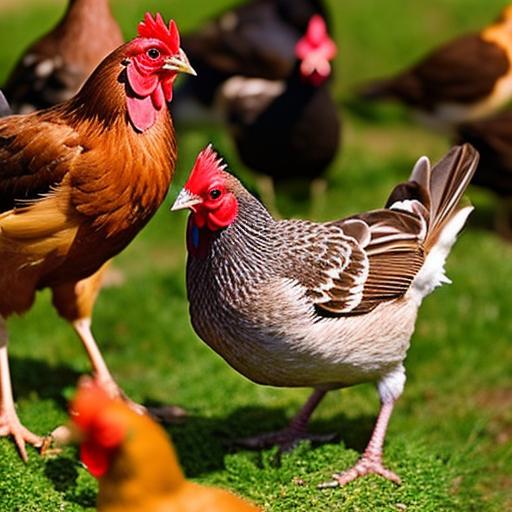In recent years, there has been a growing trend of keeping chickens in residential areas. What was once a practice mainly seen in rural areas or on farms, is now becoming increasingly popular in suburban and even urban neighborhoods. This shift can be attributed to a variety of factors, including a desire for sustainable living, the appeal of fresh eggs, and the educational opportunities it provides for children.
Backyard chicken keeping has a long history that dates back to ancient times. Chickens were domesticated over 5,000 years ago and have been kept by humans for their eggs and meat ever since. However, it is only in recent years that more people have started to keep chickens in their own backyards.
Key Takeaways
- Keeping chickens in residential areas is a growing trend.
- Understanding local laws and regulations is important before keeping chickens in your neighborhood.
- Keeping chickens in your backyard has many benefits, including fresh eggs and natural pest control.
- Choosing the right breed of chicken is important for your residential area.
- Building a chicken coop requires attention to safety and comfort for your chickens.
Understanding Local Laws and Regulations for Keeping Chickens in Your Neighborhood
Before embarking on the journey of keeping chickens in your backyard, it is important to understand the local laws and regulations regarding this practice. Different cities and towns have different rules when it comes to keeping livestock, including chickens.
Researching local laws and regulations is the first step in determining whether or not you can keep chickens in your neighborhood. This can usually be done by contacting your local government or checking their website for information on animal ordinances. Some areas may require permits or licenses to keep chickens, while others may have restrictions on the number of chickens allowed or the size of the coop.
Understanding zoning laws is also crucial when it comes to keeping chickens in residential areas. Some neighborhoods may have specific zoning regulations that prohibit the keeping of livestock, while others may have specific requirements for setbacks or coop placement. It is important to familiarize yourself with these regulations to ensure that you are in compliance with the law.
Benefits of Keeping Chickens in Your Backyard
There are numerous benefits to keeping chickens in your backyard, which is why more and more people are becoming interested in this practice. One of the most obvious benefits is the availability of fresh eggs. When you have your own chickens, you can enjoy eggs that are truly farm-fresh, with vibrant yolks and a rich flavor that is unmatched by store-bought eggs.
Another benefit of keeping chickens is their ability to provide natural pest control. Chickens are excellent foragers and will eat a wide variety of insects and pests, including slugs, snails, and even small rodents. This can help to reduce the need for chemical pesticides in your garden, making it a more eco-friendly option.
Chickens also produce high-quality fertilizer for your garden. Their manure is rich in nutrients and can be composted to create a natural fertilizer that will help your plants thrive. This can save you money on store-bought fertilizers and also reduce your environmental impact.
Keeping chickens in your backyard also provides educational opportunities for children. They can learn about where their food comes from, the life cycle of chickens, and the responsibility of caring for animals. It can be a hands-on learning experience that teaches important life skills and fosters a connection with nature.
Choosing the Right Breed of Chicken for Your Residential Area
When it comes to choosing the right breed of chicken for your residential area, there are several factors to consider. First and foremost, you need to consider the climate in which you live. Some breeds are better suited to cold climates, while others thrive in warmer temperatures.
You should also consider the size of your backyard and the amount of space you have available for your chickens. Some breeds are more suited to small spaces, while others require more room to roam. It is important to choose a breed that will be comfortable in the space you have available.
Popular breeds for backyard chicken keeping include Rhode Island Reds, Plymouth Rocks, and Australorps. These breeds are known for their hardiness, good egg production, and friendly temperaments. They are also readily available from hatcheries and local breeders.
When it comes to purchasing chickens, there are several options available. You can order day-old chicks from a hatchery, purchase pullets (young hens) from a local breeder, or even adopt chickens from a rescue organization. It is important to choose healthy birds from reputable sources to ensure the success of your backyard flock.
Building a Chicken Coop: Tips and Tricks for Creating a Safe and Comfortable Home for Your Chickens
Building a chicken coop is an essential part of keeping chickens in your backyard. A well-designed coop will provide your chickens with a safe and comfortable home, protecting them from predators and the elements.
When designing your coop, it is important to consider the needs of your chickens. They will need enough space to move around comfortably, as well as roosting bars for sleeping and nesting boxes for laying eggs. The coop should also have good ventilation to prevent the buildup of moisture and odors.
Materials needed for building a coop can vary depending on your budget and personal preferences. Some people choose to repurpose existing structures, such as sheds or playhouses, while others prefer to build their coop from scratch using new materials. It is important to use sturdy materials that will withstand the elements and keep predators out.
Keeping your coop predator-proof is essential for the safety of your chickens. This can be achieved by using hardware cloth instead of chicken wire, securing all openings with locks or latches, and burying wire mesh around the perimeter of the coop to prevent digging predators from gaining access.
Feeding and Caring for Your Chickens: A Comprehensive Guide for Beginners

Feeding and caring for your chickens is an important aspect of backyard chicken keeping. Chickens require a balanced diet that includes a combination of commercial feed, kitchen scraps, and access to fresh water.
Commercial chicken feed is readily available at feed stores and is formulated to provide all the necessary nutrients for your chickens. It is important to choose a feed that is appropriate for the age and breed of your chickens, as their nutritional needs will vary.
In addition to commercial feed, chickens can also be fed kitchen scraps. They will happily eat a wide variety of fruits, vegetables, and grains, but it is important to avoid feeding them anything that is toxic or spoiled. It is also important to provide them with access to grit, which helps them digest their food.
Clean water is essential for the health and well-being of your chickens. They should have access to fresh water at all times, and it should be changed regularly to prevent the buildup of bacteria. It is also important to provide water that is free from contaminants, such as chemicals or heavy metals.
Dealing with Common Issues and Challenges of Raising Chickens in a Residential Area
Raising chickens in a residential area can come with its fair share of challenges. One common issue is noise complaints from neighbors. Roosters can be particularly noisy, so it is important to check local regulations before keeping one in your backyard. If noise complaints arise, it may be necessary to rehome the rooster or find a compromise with your neighbors.
Another challenge of raising chickens in a residential area is the presence of predators. Depending on where you live, you may have to deal with predators such as raccoons, foxes, or even neighborhood cats. It is important to take steps to predator-proof your coop and run, such as using hardware cloth instead of chicken wire and securing all openings with locks or latches.
Dealing with sick chickens can also be a challenge for backyard chicken keepers. Chickens can fall ill for a variety of reasons, including parasites, bacterial infections, or nutritional deficiencies. It is important to monitor your chickens closely for any signs of illness and seek veterinary care if necessary. Regular health checks and good hygiene practices can help prevent many common illnesses.
The Importance of Maintaining Good Hygiene and Cleanliness in Your Chicken Coop
Maintaining good hygiene and cleanliness in your chicken coop is essential for the health and well-being of your chickens. A clean coop will help prevent the spread of disease and parasites, and also create a more pleasant environment for both you and your chickens.
Tips for keeping your coop clean include regularly removing soiled bedding, such as straw or wood shavings, and replacing it with fresh bedding. It is also important to regularly clean and disinfect the coop, paying special attention to areas where droppings may accumulate.
Preventing the spread of disease can be achieved by practicing good biosecurity measures. This includes limiting access to your coop to only essential personnel, washing your hands before and after handling chickens, and disinfecting any equipment or tools that come into contact with your chickens.
Proper disposal of chicken waste is also important for maintaining good hygiene in your coop. Chicken manure can be composted to create a natural fertilizer, but it is important to do so properly to prevent the spread of pathogens. Composting chicken manure requires a hot composting process that reaches temperatures high enough to kill any potential pathogens.
Building a Strong Relationship with Your Neighbors: Tips for Keeping the Peace When Keeping Chickens in Your Backyard
Building a strong relationship with your neighbors is crucial when keeping chickens in a residential area. It is important to communicate with them about your plans to keep chickens and address any concerns they may have.
Before getting chickens, it can be helpful to talk to your neighbors about your plans and answer any questions they may have. This can help alleviate any concerns they may have and foster a sense of understanding and cooperation.
Addressing any concerns that arise is also important for maintaining a positive relationship with your neighbors. If noise complaints arise, it may be necessary to find a compromise, such as rehoming a noisy rooster or providing soundproofing measures for your coop.
Sharing the benefits of backyard chicken keeping can also help build a positive relationship with your neighbors. Offering them fresh eggs or inviting them to visit your chickens can help them see the value of this practice and may even inspire them to start their own backyard flock.
The Joys and Rewards of Keeping Chickens in a Residential Area
In conclusion, keeping chickens in a residential area can be a rewarding and fulfilling experience. The benefits of fresh eggs, natural pest control, and educational opportunities for children make it an appealing practice for many people.
By understanding and complying with local laws and regulations, choosing the right breed of chicken, building a safe and comfortable coop, and maintaining good hygiene and cleanliness, you can successfully keep chickens in your backyard.
Building a strong relationship with your neighbors is also important for maintaining a positive experience. By communicating with them about your plans, addressing any concerns they may have, and sharing the benefits of backyard chicken keeping, you can foster understanding and cooperation.
Overall, the joys and rewards of keeping chickens in a residential area far outweigh the challenges. It is a practice that allows you to connect with nature, provide for yourself and your family, and contribute to a more sustainable way of living. So why not give it a try? You may find that keeping chickens in your backyard is one of the best decisions you ever made.
If you’re considering keeping chickens in a residential area, you may be interested in learning about the benefits of having a garden chicken coop. This article from Poultry Wizard explores how a garden chicken coop, like the one featured in Hannah Montana Chicken Coop, can provide a safe and comfortable environment for your feathered friends while also enhancing your garden’s productivity. Discover how to create a harmonious balance between urban living and poultry keeping by visiting this informative article.
FAQs
What are the benefits of keeping chickens in a residential area?
Keeping chickens in a residential area can provide a source of fresh eggs, natural pest control, and fertilizer for gardens.
Is it legal to keep chickens in a residential area?
Laws regarding keeping chickens in residential areas vary by location. It is important to check with local zoning laws and regulations before keeping chickens.
How many chickens can I keep in a residential area?
The number of chickens allowed in a residential area varies by location. Some areas may have a limit on the number of chickens allowed, while others may not have any restrictions.
What kind of housing do chickens need in a residential area?
Chickens need a secure coop to protect them from predators and the elements. The coop should be well-ventilated and have enough space for the number of chickens being kept.
What do chickens eat?
Chickens eat a variety of foods, including chicken feed, grains, fruits, and vegetables. It is important to provide them with a balanced diet to ensure their health and egg production.
Do chickens make a lot of noise?
Chickens do make noise, but the level of noise varies by breed and individual chicken. Some breeds are quieter than others, and roosters tend to be louder than hens.
What are the potential health risks of keeping chickens in a residential area?
Chickens can carry diseases such as salmonella, so it is important to practice good hygiene when handling them. It is also important to keep the coop clean to prevent the spread of disease.
Meet Walter, the feathered-friend fanatic of Florida! Nestled in the sunshine state, Walter struts through life with his feathered companions, clucking his way to happiness. With a coop that’s fancier than a five-star hotel, he’s the Don Juan of the chicken world. When he’s not teaching his hens to do the cha-cha, you’ll find him in a heated debate with his prized rooster, Sir Clucks-a-Lot. Walter’s poultry passion is no yolk; he’s the sunny-side-up guy you never knew you needed in your flock of friends!







